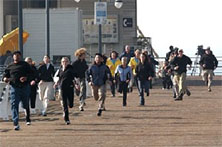November 14, 2005
Reality: It's not just for off-camera life anymore.
FREE TRUMAN
Reality Rules
How important are rules in reality competition?
| Reality competition shows are what you get when a traditional game show and a documentary love each other very much. And, like their progenitor the game show, they must abide by a strictly defined set of rules. |
Reality competition shows are what you get when a traditional game show and a documentary love each other very much. And, like their progenitor the game show, they must abide by a strictly defined set of rules. As anyone who's ever been a contestant on a game show can attest, they take those rules very seriously (we're talking escorts to the bathroom to avoid the possibility of bumping into someone who knows the questions). If you want to know why, see Quiz Show.
These rules offer more than (but most importantly) fairness. They provide consistency and foundation to the program. In the same way that all games (be it baseball or Monopoly) and all shows (from I Love Lucy to Lost) rely on predetermined formulas, so too must game shows. This consistency doesn't have to make these entertainments boring or predictable. There are an infinite number of variations and outcomes within these confines. Does playing by the same rules for a century make baseball boring? No. Baseball makes baseball boring.
Just as rules offer frameworks with which to showcase athleticism in sports or skill in board games or drama on scripted shows, they provide a skeleton to hang the real meat of reality TV — human interaction — on. However, when producers start making their presence known, interfering like Greek gods and bending the rules, they not only disrupt the consistency their programs are built on but they distract from the human interaction that keeps us watching.
 Contestants run The Amazing Race |
But what happens when one of the producers is also the onscreen judge, jury and executioner? You get The Apprentice.
Donald Trump is constantly changing rules on a whim. Why? Because he can. And because, as a producer (and probably in conjunction with producer Mark Burnett), he wants to make the show exciting. And, his tossing out of the rulebook used to be exciting. Somewhat. The first couple of times. NBC would proudly hype that week's installment as "Donald breaks the rules of The Boardroom!" Now it seems to happen every week.
For those of you who've never watched The Apprentice, the rules of The Boardroom are quite simple and clear. When a task is complete, the losing team goes to The Boardroom. After some discussion about what went wrong, the Project Manager chooses two people (in some seasons, up to three) to come back to The Boardroom with them. They return and things get nasty. Ultimately, The Donald unleashes the hand cobra or the finger gun and says, "You're fired!" George and Caroyln nod their heads and tell him he had no choice. Simple. Easy to understand. Didn't stop the show from becoming a phenomenon in its first season.
But rules are for chumps, not Trump. Sometimes he fires two contestants in one sitting. Sometimes he decides for the Project Manager which of their teammates they'll bring back to The Boardroom, or how many of them or even if they'll bring anybody back. Sometimes he brings an entire team back after they've already gone up to the suite (or is that just Martha? I get confused). Sometimes he brings two teams to the boardroom, saying they both lost (in that case, he may have been right, but it's still akin to saying that since neither candidate earned 50% of the vote, we won't have a president for the next four years). And then, three weeks ago, he jettisoned four at once!
Now, surely, like most reality goings-on, these maneuvers can't be entirely unscripted. After all, by eliminating four applicants one week and two more just two weeks later (the only thing shocking about this episode was that there is a 23 year-old man out there who needed to be given a Cliff's Notes version of the Star Wars story), he effectively cut this season's number of episodes by four — not that they don't have ways of stretching things out interminably. Regardless, all of these cheap stunts violate what the game of The Apprentice is about.
| We get it. The Donald is all-powerful. He's a rebel. He doesn't play by the rules. However, this laissez-faire attitude makes Trump and his show even more of parodies than they already are. |
Which isn't to say that Survivor never changes the rules. After its first season, I wondered how they could keep it interesting since much of the fun of Borneo was watching the castaways figure out how to play the game while it was unfolding. Richard Hatch was the only one out of sixteen who saw the necessity of forming an "alliance" - a word that's since become as much a part of reality competition shows as backstabbing and product placements. By the time the second season went into production, everyone went in looking for an alliance and everyone wanted to be Richard Hatch. The game was already forever changed, so producers stepped in to change it up even more.
As I noted in my Emmy column, "When maestro Mark Burnett tries too hard to switch up the game with outrageous twists, he misses as often as he hits (the infamous return of the Outcasts on Pearl Islands was considered a shark-jumper by many, but Thailand's merge-that-wasn't beautifully messed with every fan's expectations — especially Shii Ann's)." Really, these twists aren't "rule-breakers" like The Apprentice's, because things like the merge are never specified in the rules — they're just assumed. And we all know that when you assume, you make an ass out of you and Shii Ann. Part of the strategy and fun of playing/watching Survivor is to expect the unexpected (or is that Big Brother? I get confused).
 |
And that's what I loved most about Forever Eden — it didn't make a lick of sense. In its gonzo lunacy, it was like playing a game with a child who makes up the rules as they go along. Or maybe it was more like the card game Mao in that the rules were in place from the start, and, given enough episodes, patience and unhealthy attention, they would've become clear. Tragically, though I gave it more than enough patience and unhealthy attention, I was not given enough episodes to decipher the Eden code. But that didn't stop me from enjoying it like one of those Japanese game shows that comes on in Las Vegas hotel rooms.
In the universal language of game shows, who needs rules?
Email the author.
Return to Season 2, Episode 5.
All written content © 2005 by the authors. For more information, contact homer@smrt-tv.com
